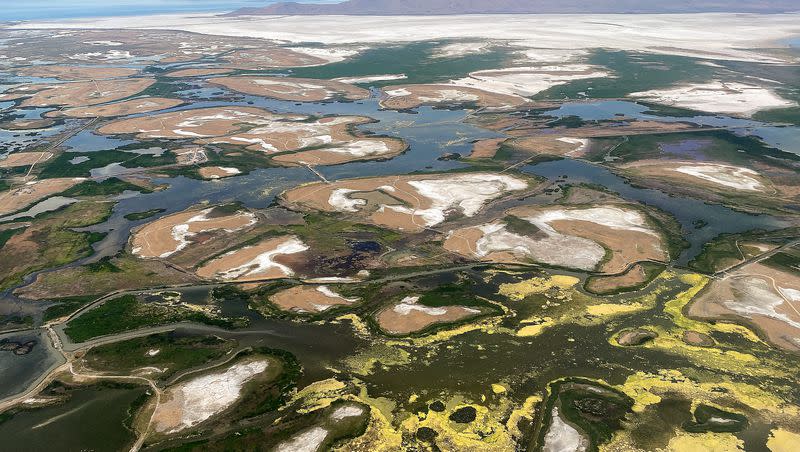No ‘legal personhood’ for the Great Salt Lake, Utah legislative committee decides

The Great Salt Lake and other bodies of water — along with just about anything else that could be considered nonhuman — wouldn’t qualify for “legal personhood” under a bill endorsed Tuesday by the Utah Legislature’s House Business and Labor Committee.
The sponsor of the bill, HB249, Rep. Walt Brooks R-St. George, said he initially didn’t believe the constituents who first approached him about the need for legislation barring government entities from recognizing that nonhumans have legal standing.
“I honestly just laughed. I thought it was silly that we’d have to identify what a person is,” Brooks said. But he said his online research found that “usually attorneys and environmentalists” are “using it as a weapon.”
Related
He said while animals, bodies of water and other aspects of nature are valued, they shouldn’t be treated like people in the eyes of the law, for example, by having a guardians appointed for their protection.
“It’s just, in my opinion, completely inappropriate,” Brooks said, adding he’s told his children that “dairy cows, they need to be pregnant in order to give milk. That’s just the way animals work. If you get a cow pregnant without consent, that’s sexual harassment?”
He said lawmakers “need to make sure we keep what a person is clearly identified.”
But the half-dozen members of the public who testified against the legislation disagreed. The committee ended up voting advancing the bill to the full House, with only Rep. Brian King, D-Salt Lake City, opposed.
Nan Seymour of Save Our Great Salt Lake said she was representing more than 1,200 Utahns who rallied at the state Capitol last Saturday to urge lawmakers to take bolder steps to save what she called a “sacred” body of water.
“As a center of our ecosystem, the Great Salt Lake has a right to live, flourish and be replenish,” Seymour said, adding that nature “thrives and then so does everyone” in places where when those rights have been legally extended to ecosystems.
“The clock is ticking here in Utah. We all know we’re on a precipice. Citizens are counting on you as leaders to make these very difficult decisions that would give water to the lake this season because we cannot live here without it,” she said.
Seymour questioned why lawmakers would want “to take a possible solution off the table when this existential crisis is not yet adequately addressed.” She said there is a “moral and spiritual imperative to protect our land.”
She did, however, acknowledge that “the term person is loaded. I understand the concern. But the lake is an intelligent and sentient entity. Also, the creator of the world that we’re in ... I’m coming with that reverence to say we should pursue that path.”
John Meier, who was filming the hearing as part of a documentary and Seymour’s efforts on behalf of the Great Salt Lake, told the committee that nature is “full of life and spirt” and should be considered people for certain purposes, just as corporations are.
Utah State University student Sadie Braddock said a poll about the Great Salt Lake conducted by the university of the state’s residents found that some 60% support using the “rights of nature” to help protect it, which she later said is the same as legal personhood.
Related
Nearly a year ago, the term surfaced in a widely circulated guest essay in The New York Times written by Utah author Terry Tempest Williams about the dire plight of the Great Salt Lake.
She asked in the essay, “Why not grant personhood rights to Great Salt Lake,” even though a yearslong effort by Ohio residents to do the same for Lake Erie was overturned by a federal judge.
Describing such a move as “the new frontier of granting legal status to a living world,” Williams said a designation of personhood “ is not a radical but a rational response to an increasingly wounded Earth.”
During the hearing on the bill, Brooks said his bill isn’t intended to focus on the Great Salt Lake. Instead, he said, he believes lawmakers “need to identify, just like we have done with what is a boy, what is a girl,” what legal personhood is to get ahead of any potential issues.
His bill prohibits governmental entities from granting or recognizing legal personhood in a list of categories that includes artificial intelligence, bodies of water, land, gases, astronomical objects, weather, plants, nonhuman animals and “any other member of a taxonomic domain that is not a human being.”

